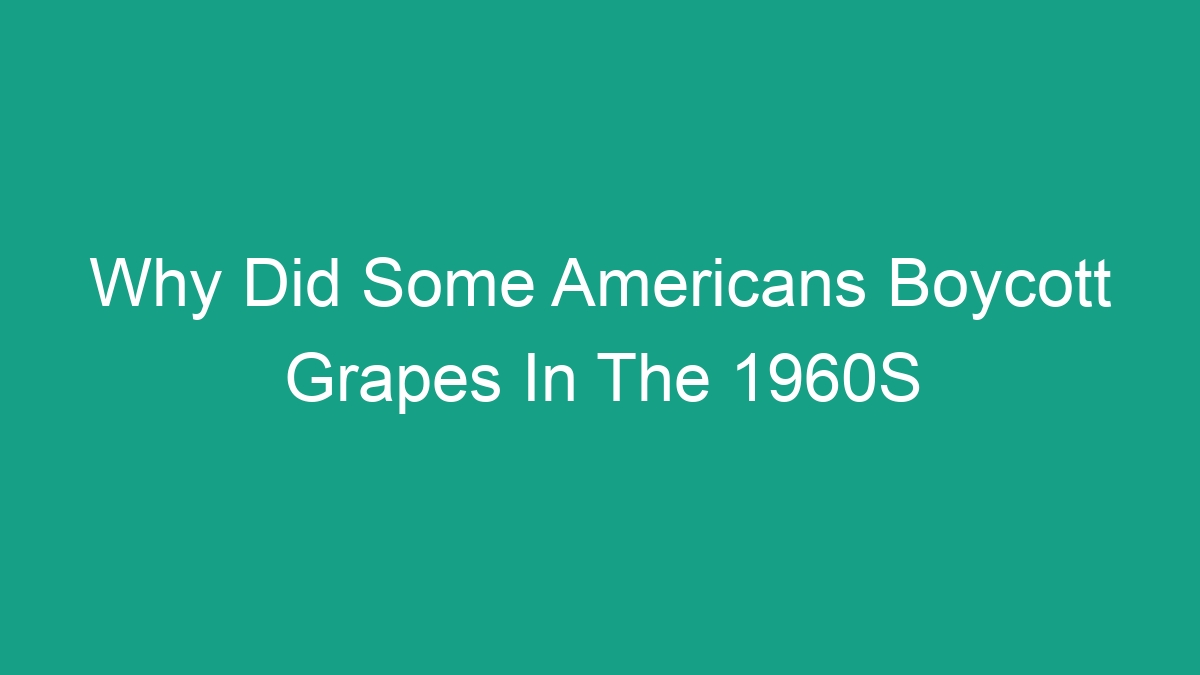
The 1960s was a pivotal decade in American history, marked by significant social and political movements. One of the lesser-known but impactful events during this time was the grape boycott, which saw some Americans refusing to purchase and consume grapes. This boycott was not just a random act but had a specific, powerful reason behind it. Let’s delve into the details of why some Americans decided to boycott grapes in the 1960s.
The Farm Workers’ Movement
The United Farm Workers (UFW) movement was a key player in the grape boycott of the 1960s. Led by influential labor leader Cesar Chavez, the UFW sought to improve the working conditions and wages of farm workers, who were often exploited and marginalized. The grape boycott was one of the primary strategies employed by the UFW to draw attention to the plight of farm workers and pressure grape growers to negotiate fair labor contracts.
Exploitative Working Conditions
Farm workers in the 1960s faced harsh and exploitative working conditions. Long hours, low wages, exposure to harmful pesticides, and lack of job security were rampant in the agricultural industry. Additionally, many farm workers did not have access to basic amenities such as clean drinking water and proper sanitation facilities. The UFW highlighted these issues and called for reforms through the grape boycott, aiming to shed light on the deplorable conditions faced by those laboring in the fields to harvest grapes.
Importance of Collective Bargaining
One of the central demands of the UFW during the grape boycott was the implementation of collective bargaining rights for farm workers. Collective bargaining allows workers to negotiate with their employers for better wages, working conditions, and benefits as a unified force, rather than as individuals. The UFW recognized that collective bargaining was essential for empowering farm workers and enabling them to secure fair treatment in an industry where they were historically disadvantaged.
Role of Civil Rights Movement
The 1960s was also a time of heightened civil rights activism. The grape boycott intersected with the broader civil rights movement, as Cesar Chavez and the UFW sought to garner support from diverse communities across the United States. Many individuals who were actively involved in the fight for racial equality and justice saw the grape boycott as a way to stand in solidarity with farm workers and challenge the systemic injustices prevalent in the agricultural sector.
Impact of the Grape Boycott
The grape boycott had a profound impact, both in terms of raising awareness about the plight of farm workers and bringing about tangible changes in the agricultural industry. The widespread participation in the boycott compelled grape growers to acknowledge the grievances of farm workers and engage in negotiations with the UFW. Ultimately, the grape boycott contributed to the establishment of labor contracts that granted farm workers improved wages, better working conditions, and the right to collective bargaining.
FAQs
1. What were the specific issues that farm workers faced in the 1960s?
Farm workers in the 1960s confronted a host of challenges, including long hours, low wages, exposure to harmful pesticides, and inadequate access to basic amenities such as clean water and sanitation facilities.
2. How did the grape boycott contribute to the improvement of farm workers’ conditions?
The grape boycott drew attention to the exploitative working conditions of farm workers, prompting grape growers to negotiate fair labor contracts with the United Farm Workers. As a result, farm workers secured better wages, improved working conditions, and the right to collective bargaining.
3. Was the grape boycott only about improving the conditions of farm workers?
While the primary focus of the grape boycott was to advocate for the rights of farm workers, it also intersected with the broader civil rights movement, enlisting support from individuals who were engaged in the struggle for racial equality and justice.



